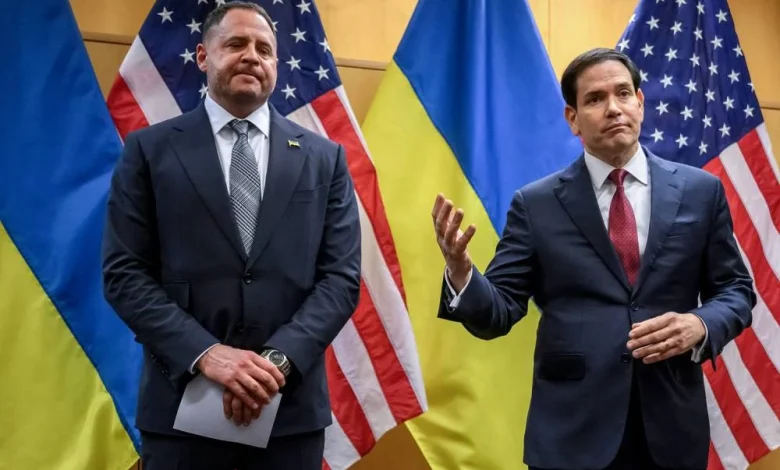Trump’s Ukraine Peace Effort Devolves Into Chaos Over Conflicting Stories

HALIFAX, Nova Scotia—Fresh controversy around a divisive plan to end Russia’s war in Ukraine emerged on Saturday, introducing new confusion into what was already a chaotic diplomatic process.
At an annual trans-Atlantic gathering in Canada, several senior U.S. senators, including at least one Republican, told reporters that they had spoken with U.S. Secretary of State Marco Rubio that day and been told that the 28-point proposal that the Trump administration has spent the last several days pushing Ukraine to accept represented Moscow’s wish list and was not the position of the Trump administration.
However, the State Department later that day called the information provided by the senators “blatantly false.”
Republican Sen. Mike Rounds said during a press conference at the yearly Halifax International Security Forum in Canada that Rubio had initiated a call that afternoon with Rounds and Sen. Jeanne Shaheen, a Democrat and the longtime leader of the annual bipartisan congressional delegation to the conference.
“He made it very clear to us that we [the United States] are the recipients of a proposal that was delivered to one of our representatives,” said Rounds, who told reporters that he was sharing the contents of the call with Rubio’s agreement. “It is not our recommendation. It is not our peace plan. It is a proposal that was received [from Russia], and as an intermediary, we have made arrangements to share it, and we did not release it. It was leaked.”
The revelation was met with bewilderment, raising serious questions such as why, if the proposal was Russian-authored and not backed by the United States, has U.S. President Donald Trump been pushing so hard for Ukrainian President Volodymyr Zelensky to accept it—even going as far as giving him a deadline of Thursday to respond?
But the confusion didn’t end there. Rubio, who was traveling to Geneva for meetings with senior Ukrainian officials, insisted in a Saturday night post on X that the “peace proposal was authored by the U.S. It is offered as a strong framework for ongoing negotiations. It is based on input from the Russian side. But it is also based on previous and ongoing input from Ukraine.”
The conflicting narratives that emerged on Saturday typified the Trump administration’s chaotic, dysfunctional approach to the peace plan so far.
The 28-point proposal is understood to have been developed late last month between Kirill Dmitriev, a Russian envoy and the head of Russia’s sovereign wealth fund, and U.S. special envoy Steve Witkoff.
The plan, which was first reported by Axios on Nov. 18, caught both Ukraine and European allies off guard and has been met with considerable criticism from Ukrainians, Europeans, and many senior Republican lawmakers, who have argued that it would reward Russia’s military aggression against Ukraine with more territory, leave the Eastern European country seriously weakened, and constrain NATO.
Also, of great concern to critics were reports that the Trump administration had warned Ukraine that if it didn’t sign on to the plan, it would face losing access to critical U.S. battlefield intelligence and U.S. weapons donated by Europeans. However, Rounds told reporters, “We are not aware of any discussion by the administration of limiting [weapons and intelligence] support based upon that discussion” with Rubio.
The administration has claimed that most of the plan was approved by Rustem Umerov, the secretary of Ukraine’s National Security and Defense Council. But Umerov, a close advisor to Zelensky, denied that he offered “approvals of any points.”
The plan’s disclosure prompted a flurry of diplomatic talks, with U.S. Army Secretary Dan Driscoll being dispatched to Kyiv this week to meet with Ukrainian and European officials. His suddenly prominent role in these discussions, which continued in Geneva on Sunday, was yet another surprise, given his lack of prior involvement in the Ukraine peace process.
The opposition to the plan from so many prominent Republicans is noteworthy because of the power they could collectively flex should they work with Democrats in Congress to block implementation of key aspects of the plan related to the future of NATO, recognition of Russia’s annexation of Ukrainian land, and sanctions relief for the Russian economy.
Among these Republican critics is Sen. Roger Wicker, the chair of the Senate Armed Services Committee, who wrote in a post on X on Friday, “Ukraine should not be forced to give up its lands to one of the world’s most flagrant war criminals in [Russian President] Vladimir Putin.” Sen. Mitch McConnell, the former longtime Senate Republican leader, issued a statement accusing Trump officials of being “more concerned with appeasing Putin than securing real peace” and comparing any capitulation to former U.S. President Joe “Biden’s abandonment of Afghanistan.”
Given such pushback, it was not entirely surprising when Rounds and other senators at Halifax said Rubio, a well-known Russia hawk in the U.S. Senate before his time as Trump’s chief diplomat, was disavowing U.S. ownership of the unpopular proposal.
Sen. Angus King, an independent who caucuses with Democrats, told reporters that he had texted Rubio about his concerns with the proposal and that Rubio had responded by offering to talk to him on Saturday. The two men then “had a lengthy conversation,” according to King, who said he was encouraged that “the administration is not attempting to negotiate this agreement unilaterally but is indeed in close consultation in the next few days with Ukraine.”
“I think it is fair to say that this document represents the Russian position,” King added. “It has now been presented to the Europeans and to the Ukrainians, and they are going to review it and come back.”
As a senator, Rubio served for years with King and Rounds on the exclusive Senate Intelligence Committee. Shaheen has also had a close relationship with Rubio from the time they served together on the Senate Foreign Relations Committee.
Therefore, it was baffling that each of the three senators could have so misunderstood Rubio in their separate conversations with him about the origins of the proposal, which is what the State Department now appears to be saying.
State Department deputy spokesperson Tommy Pigott said King’s statement that the plan was essentially a Russian wish list was “blatantly false.”
“As Secretary Rubio and the entire Administration has consistently maintained, this plan was authored by the United States, with input from both the Russians and Ukrainians,” Pigott wrote on X.
The confusion continued Saturday night. During a dinner at the forum, Rubio called at least one of the senators “to clarify in case he had been misunderstood that while this document clearly strongly reflects Russian priorities, it was not written by [the] Russians” and was “the result of consultations” between the U.S. and Russian sides, said an attendee of the dinner, who was aware of the contents of the call.
Rounds put out a brief statement on Saturday that did not walk back his statements to the press but also did not echo some of the harsher criticisms of the plan that his Republican colleagues used at the conference.
“I appreciate Secretary Rubio briefing us earlier today on their efforts to bring about peace by relying on input from both Russia and Ukraine to arrive at a final deal,” Rounds said.
Republican Sen. Thom Tillis, who with Shaheen is the co-chair of the Senate NATO Observer Group, said that he felt McConnell wasn’t harsh enough in his rebuke of the proposal.
“I’m disappointed with what Mitch said because I don’t think he was forceful enough,” Tillis said during a Saturday morning plenary session at Halifax. “We should not do anything to make him feel like he [Putin] has a win here. He is a murderer. He is a rapist. He is a thug. He invaded a sovereign nation.”
Indeed, the proposal was the subject of widespread criticism at the Halifax forum, an annual confab that typically features heavy participation by Canadian government and military officials as well as senior European officials and delegates from other democracies such as Australia, South Korea, and Taiwan. This year, for the first time, there was no official participation from the U.S. Defense Department or any other U.S. agency.
Some participants in the forum said the 28-point plan could be useful as the starting point of negotiations with both Ukraine and Europe of what they are prepared to bargain over in a final peace settlement with Russia.
“It will take more time than next Thursday … but use this momentum in a positive way to get European nations and Ukraine together and then start the discussion from there,” Gen. Onno Eichelsheim, the commander of the Netherlands Armed Forces, said in an interview on the sidelines of the forum.
Sam Skove contributed to this report.





